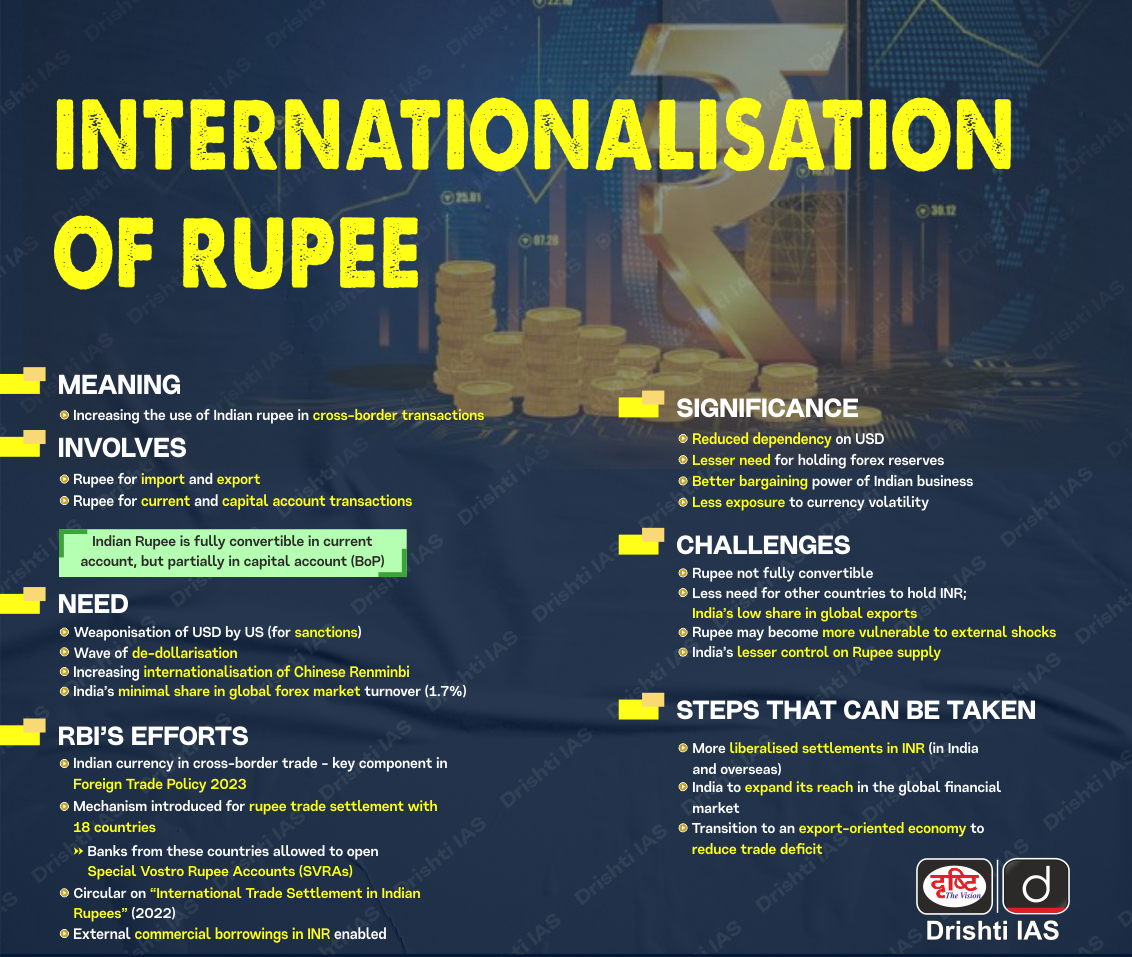RBI Liberalizes FEMA Rules for Cross-Border Transactions | 21 Jan 2025
Why in News?
The Reserve Bank of India (RBI) has liberalized norms under the Foreign Exchange Management Act (FEMA) of 1999 to promote the use of the Indian Rupee (INR) in cross-border transactions.
- This initiative aims to stabilize the INR and encourage its internationalization, especially at a time when the currency is facing depreciation pressures.
What are the Changes Made in FEMA Regulations by RBI?
- Opening INR Accounts for Non-Residents: Overseas branches of Authorized Dealer banks can now open INR accounts for non-residents. This allows non-residents to settle all permissible current and capital account transactions with residents of India in Indian Rupees.
- Repatriable INR Accounts: The RBI has enabled non-residents to settle transactions with other non-residents using balances in their repatriable INR accounts, such as Special Non-Resident Rupee Accounts (SNRR) and Special Rupee Vostro Accounts (SRVA).
- Foreign Investment: Non-resident Indians (NRIs) can now use the balances in their INR accounts to make foreign investments, including Foreign Direct Investment (FDI) in non-debt instruments. This strengthens the role of INR in global investment flows.
- Foreign Currency Accounts for Exporters: Indian exporters can now open accounts in any foreign currency overseas to settle trade transactions. This includes receiving export proceeds and using those funds to pay for imports.
NRI Accounts
- NRE Account: An NRE (Non-Resident External) Account can be opened by NRIs with earnings from their country of residence, but the funds are held in Indian rupee denominations.
- Income from the NRE account is tax-free, with both principal and interest exempt from taxation.
- NRO Account: An NRO (Non-Resident Ordinary) Account opened by NRIs to manage income earned in India (e.g., rental income, business income, dividends, etc.), , and is held in INR denominations. Interest earned on an NRO account is taxable.
- FCNR (B) Account: An FCNR (Foreign Currency Non-Residential) Account allows NRIs or Persons of Indian Origin (POIs) to deposit earnings in their country of residence in any of the prescribed foreign currencies by RBI.
- Income from an FCNR account is tax-free, including both principal and interest.
Foreign Exchange Management Act (FEMA), 1999
- About: The FEMA, enacted in 1999, replaced the older Foreign Exchange Regulation Act (FERA) of 1973.
- Its primary aim is to promote external trade and payments while ensuring the orderly development of India's foreign exchange market, in line with the country’s post-liberalization economic changes.
- FEMA categorizes foreign exchange transactions into Current Account Transactions and Capital Account Transactions.
- Capital Account Transaction: It refers to transactions that alter the assets or liabilities outside India of residents in India or vice versa.
- Key transactions under this category include the transfer or issuance of foreign securities, borrowing or lending in foreign exchange or rupees between residents and non-residents, export/import of currency notes, and acquisition or transfer of immovable property in India or abroad.
- Current Account Transaction: Includes transactions that are not related to capital account transactions. It encompasses payments for foreign trade, services, and income from investments, as well as transfers such as remittances and foreign aid.
- Key Objectives and Provisions:
- Civil Offences: Violations under FEMA are treated as civil offences, unlike FERA, which was criminal in nature.
- RBI’s Role: The RBI has the authority to issue rules and oversee the implementation of FEMA.
Internationalization of Rupee
- About: It involves increasing its use in cross-border transactions, starting with trade, followed by current and capital account transactions.
- In July 2022, India introduced the Special Rupee Vostro Account (SRVA) to boost INR use in trade.
- Additionally, the RBI signed Memorandums of Understanding (MoUs) with the central banks of the UAE, Indonesia, and Maldives to encourage cross-border transactions in local currencies.
- In December 2023, the Foreign Exchange Management Regulations were revised to allow cross-border transactions in all foreign currencies, including INR.
UPSC Civil Services Examination, Previous Year Questions (PYQs)
Prelims:
Q1. Convertibility of rupee implies (2015)
(a) being able to convert rupee notes into gold
(b) allowing the value of rupee to be fixed by market forces
(c) freely permitting the conversion of rupee to other currencies and vice versa
(d) developing an international market for currencies in India
Ans: (c)
Q2. With reference to Balance of Payments, which of the following constitutes/ constitute the Current Account? (2014)
- Balance of trade
- Foreign assets
- Balance of invisibles
- Special Drawing Rights
Select the correct answer using the code given below:
a. only
b. 2 and 3
c. 1 and 3
d. 1, 2 and 4
Ans: (c)

